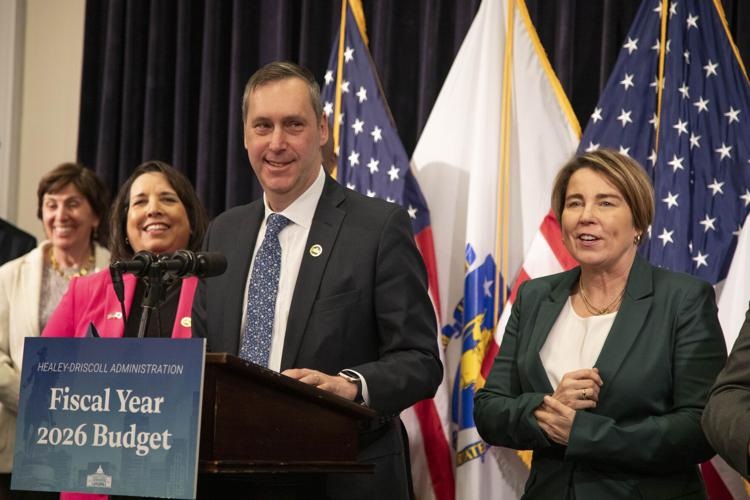latest
Influential Massachusetts coalition targets corporate taxes, rainy day fund

Alison Kuznitz
BOSTON, FEB. 18, 2025…..An influential coalition that shepherded passage of the income surtax on wealthier Massachusetts residents is preparing to launch a lobbying push this session for a “corporate fair share” policy targeting global businesses that advocates say evade millions of dollars in state taxes.
Raise Up Massachusetts is working to build momentum for legislation addressing “offshore tax havens,” which coalition members say are used by global corporations like Apple, Amazon, McDonald’s and Walmart to steer profits overseas and dodge taxes.
More heavily taxing those corporations could yield hundreds of millions of dollars in new funding for Massachusetts, according to a Raise Up official, who said more concrete estimates will be available this spring. The proposal already faces pushback from a prominent business group that says Massachusetts needs more clarity from the federal government before adjusting the state’s tax code.
Advocates say they also want the Legislature to tap the state’s rainy day fund to stave off Gov. Maura Healey’s proposed health care budget cuts and alleviate looming federal funding shortfalls, including for Medicaid. The Raise Up spokesperson suggested around $1 billion should be pulled from the nearly $9 billion reserve account, which lawmakers are hesitant to use over concerns of jeopardizing the state’s bond rating.
“I think anyone looking at this logically will be able to see that the need is going to be so dire,” said Cindy Rowe, CEO of the Jewish Alliance for Law and Social Action, a founding member of Raise Up. “I think voters will be contacting their elected officials and saying, if you have a choice between using the money that has been built up in the rainy day fund to the highest amount of all time — record levels of money in the rainy day fund — and you have a choice on whether to impose a tax on multi-billion-dollar corporations, who are already being taxed on that money in other states, there is no choice.”
Doug Howgate, president of the Massachusetts Taxpayers Foundation, cautioned against making premature taxation policy changes before seeing federal tax and spending proposals. He argued a “major corporate tax increase” here would “clearly run counter to the relatively broad consensus we’ve seen over the last few years of trying to increase the state’s competitiveness.”
“Given the uncertainty with what the feds are going to do, it doesn’t make any sense to contemplate a change at the state level,” Howgate said. “I don’t think it makes sense to move forward with a proposal like that at all.”
Past attempts to address offshore tax measures have failed to clear the Revenue Committee.
But with budget writers potentially facing tough choices, Raise Up supporters are promoting their solution to help the state leverage a new revenue stream through bills (HD 3390 / SD 1684) from Rep. Carlos González and Sens. Jason Lewis and Liz Miranda. The coalition also wants the policies to be filed as budget policy riders in the House and Senate this spring.
Raise Up, composed of more than 100 groups, has in recent years successfully pushed to raise the minimum wage and enact the income surtax, a major funding source to cover education and transportation investments.

“I’m excited to be partnering once again with Raise Up Massachusetts to make our corporate tax system fairer and raise revenue to help meet many needs across the Commonwealth,” Lewis said in a statement. “This proposal would align Massachusetts’ corporate tax policy with many other states and help put our small businesses on a more level playing field as they compete against huge multinational corporations.”
The bills look to increase the portion of excess foreign profits that Massachusetts can tax, building off a federal government formula called Global Intangible Low-Taxed Income (GILTI). Massachusetts currently taxes 5% of GILTI when calculating global corporations’ state taxes, while the bills would raise that share to 50%.
New Hampshire, Rhode Island, Vermont and Maine already tax 50% of GILTI, supporters say. Raise Up previously struggled to secure support for the GILTI hike in Massachusetts as advocates recommended strategies for shoring up transportation funding.
“I filed the bill to advocate for a tax structure that aligns more closely with our neighboring states, ensuring that Massachusetts is competitive while holding corporations accountable,” González said in a statement. “This initiative comes in response to the glaring disparity in tax rates that has persisted since 2017, particularly in light of many New England and Mid-Atlantic states setting their GILTI (Global Intangible Low-Taxed Income) tax rate at 50%.”
The Springfield Democrat said the additional tax revenues could fund education, infrastructure and health care investments.
“I believe Massachusetts should join other states and create a fair tax environment where large multinational corporations contribute equitably to the communities in which they operate,” González added.
Adjusting the GILTI tax policy could reverse or “mitigate” Healey’s fiscal 2026 budget health care cuts, said Harris Gruman, executive director of the SEIU Massachusetts State Council. Gruman, who helped author the income surtax constitutional amendment, said embracing the corporate tax law change is “long overdue.”
“We’re really leaving money on the table that’s already basically approved by the federal government,” Gruman said. “We’re not doing something the federal government frowns on or has never done, and we’re not doing something that our neighboring states frown on or have never done.”
He added, “So it just seems like real unfinished business.” By raising new revenue, Gruman argued Massachusetts can also dip into reserves without hurting its bond rating.
Howgate said policymakers must broadly evaluate the state’s tax code before tinkering with the GILTI policy. Focusing on one tax policy in isolation could lead to “counterintuitive results,” he said.
The MTF head stressed that once Massachusetts taps into the rainy day fund, those resources are “gone.”
“The idea that we would preemptively dip into rainy day funds before we even see what we might need to react to, from whether the federal level or the broader economic level, I just don’t think that seems like a very thoughtful strategy,” Howgate said.






